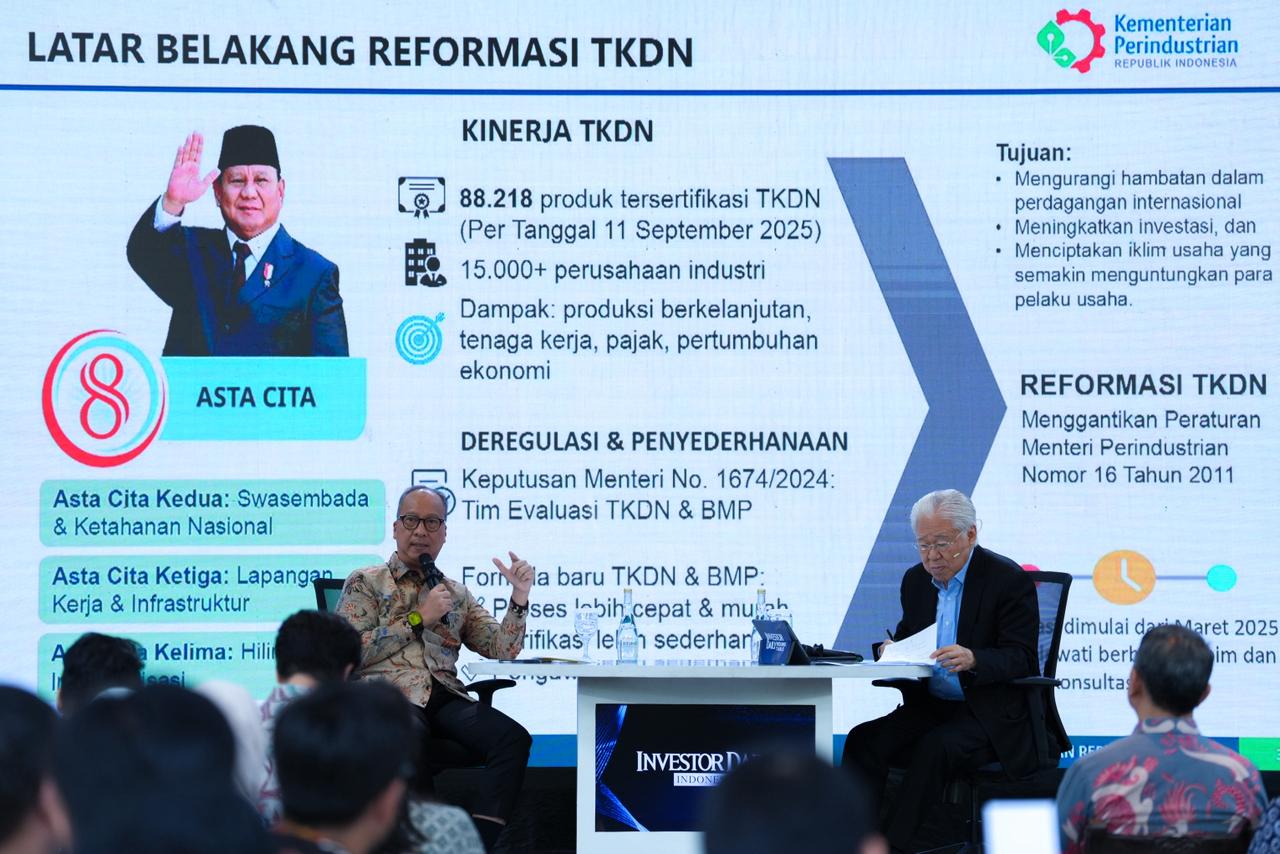The Ministry of Industry has issued Regulation No. 35 of 2025 concerning the Procedure for Issuing the Domestic Component Level (TKDN) Certificate. This new regulation replaces the 2011 version and marks a major step in strengthening Indonesia’s industrial ecosystem through a framework that is more affordable, accessible, efficient, and incentive-driven.
Minister of Industry Agus Gumiwang Kartasasmita explained that discussions for the revision began in March 2025. “Regulations cannot and must not be seen as sacred. When new dynamics and needs arise in the field, the government must be bold in re-regulating,” he said in Jakarta on October 15.
Agus clarified that the revision was initiated independently and not due to external pressure. “Trump Tariffs were only applied on April 1, 2025, while our revision discussions began a month earlier. This shows a collective national awareness to strengthen local products,” he stated.
Clear Criteria for Domestic and Imported Products
The TKDN policy applies to all industrial products procured by the government and state-owned or regional-owned enterprises. The main criterion is not the product’s technological level but the ability of domestic industries to manufacture it.
If domestic industries can already produce high-tech products, the government is obligated to prioritize them over imports. However, if local capabilities are lacking, importing similar products is allowed. For household and private sector purchases, the TKDN application depends on policies set by other ministries overseeing the respective sectors.
“The implementation of TKDN for high-tech products is not based on whether the industry is high-tech or not, but on the assessment by the relevant ministries to attract investment and develop the sector,” Agus explained.
More Efficient Certification and Tangible Incentives
The new regulation introduces improvements to the certification process, making it cheaper, simpler, and faster. As of now, 88,000 products from 15,000 companies are already certified and listed in the e-catalog. The ministry targets doubling this number within two years.
“To make mandatory TKDN implementation effective, the key is to flood the e-catalog with domestic products,” Agus said.
Permenperin 35/2025 also incorporates incentives into the TKDN calculation. Industries that invest and build factories in Indonesia automatically receive a 25% value-added score. An additional 10% is awarded for employing local labor, and 15% more for implementing Best Manufacturing Practices (BMP).
“BMP has been simplified and made more inclusive. There are 15 determining factors, including the use of local labor, new investment, partnerships, supply chain strengthening, and import substitution. Altogether, these components can contribute up to 38%,” Agus explained.
These combined elements make it easier for companies to reach the 40% TKDN threshold required for government procurement. “This is how we deliver regulation that is affordable, easy, fast, and provides real incentives for businesses,” he added.
Strengthening Key Sectors Through Mandatory TKDN
Agus highlighted successful examples in specific sectors. In the mobile device sector—including handphones, tablets, and handheld computers—the Ministry of Communication and Digitalization enforces a minimum 35% TKDN requirement for distribution permits. This policy has led to increased investment and reduced imports in the sector.
In the healthcare sector, the Ministry of Health mandates that medical devices must have a 20–30% TKDN level to be distributed in domestic hospitals. “If other ministries follow this approach, I’m confident our national manufacturing will take off,” Agus said.
The regulation also encourages consumer industries to display TKDN values on their products, even if they are not bound by distribution permit requirements or procurement regulations. “We don’t mandate it, but we encourage it. The goal is for consumers to see the TKDN label and choose local products,” he stated.
Public Spending Must Benefit Domestic Industry
Agus emphasized that the TKDN policy is grounded in fiscal justice. Since government spending comes from taxpayer funds, it must benefit local industries and workers. “We want to protect jobs and the national industrial ecosystem. That’s why if a domestic product has more than 40% TKDN, the government spending must use it and cannot import,” he said.
The regulation also aligns with broader national development goals, including increasing the value of domestic resources, strengthening industry, and expanding employment. “Every rupiah spent on domestic products should create Rp2 of added value in the country,” he noted.
PHOTO: KEMENPERIN
This article was created with AI assistance.
Read More






 Saturday, 31-01-26
Saturday, 31-01-26







